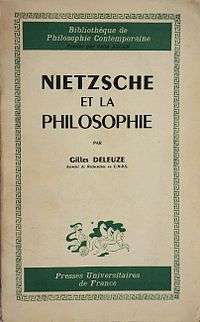Nietzsche and Philosophy
 Cover of the first edition | |
| Author | Gilles Deleuze |
|---|---|
| Original title | Nietzsche et la philosophie |
| Translator | Hugh Tomlinson |
| Country | France |
| Language | French |
| Subject | Friedrich Nietzsche |
| Published |
|
| Media type | Print (Hardcover and Paperback) |
| Pages | 221 (Columbia University Press edition) |
| ISBN | 0-231-05669-9 (English edition) |
Nietzsche and Philosophy (French: Nietzsche et la philosophie) is a 1962 book about Friedrich Nietzsche by philosopher Gilles Deleuze, in which Deleuze treats Nietzsche as a systematically coherent philosopher, discussing concepts such as the will to power and the eternal return. Nietzsche and Philosophy is a celebrated and influential work. Its publication has been seen as a significant turning-point in French philosophy, which had previously given little consideration to Nietzsche as a serious philosopher.
Summary
Deleuze writes that the reception of Nietzsche's thought has involved two key issues, those of whether it helped to prepare the way for fascism, and whether it deserves to be considered philosophy. Deleuze, who compares Nietzsche to Baruch Spinoza, considers Nietzsche as one of the greatest philosophers of the 19th century, crediting him with altering "both the theory and the practice of philosophy." Deleuze argues that Nietzsche's concepts, such as the will to power and the eternal return, have been generally misunderstood, the former as primarily concerning "wanting or seeking power", and the latter as "the return of a particular arrangement of things after all other arrangements have been realised...the return of the identical or the same". Deleuze notes that in Thus Spoke Zarathustra (1883), Nietzsche twice denies that "the eternal return is a circle which makes the same return."[1]
Reception
Nietzsche and Philosophy became a celebrated work.[2] Philosopher Peter Dews writes that Nietzsche and Philosophy was central to the post-structuralist texts of the decade that followed its publication, including Deleuze's Anti-Oedipus (1972).[3] According to Ronald Bogue, Nietzsche and Philosophy marked a significant turning-point in French philosophy, which had previously given little consideration to Nietzsche as a serious or coherent philosopher. Bogue writes that Deleuze was one of the first commentators to discuss the concepts of the will to power and the eternal return carefully, and that Nietzsche and Philosophy raised questions that became central to Nietzsche studies and to French post-structuralism. He adds that many of the central themes of Deleuze's later work were first stated in the work.[4] Michael Tanner calls the book "quite wild about Nietzsche, but interesting about Deleuze."[2]
Academics Bernd Magnus and Kathleen Higgins write that Deleuze, like philosophers such as Jacques Derrida, Alexander Nehamas, and Richard Rorty, depicts Nietzsche as "attempting to liberate us from the felt need to provide theories of knowledge, or moral theories, or ontologies."[5] Nehamas argues that Nietzsche has a "double relation" to the philosophical tradition, undermining it while being aware that he cannot completely reject it, maintaining that Deleuze's view that Nietzsche originated a radical mode of "nondialectical" thought attributes an unequivocal view to Nietzsche he could not have held.[6] Daniel W. Smith identifies Nietzsche and Philosophy as "one of the most important and influential, as well as idiosyncratic, readings of Nietzsche to have appeared in Europe."[7] Stephen Houlgate rejects Deleuze's view of Hegelian dialectic as the ultimate denial of life, writing that Deleuze was mislead by Nietzsche.[8] Academic Hans Sluga identifies Nietzsche and Philosophy as a possible influence on philosopher Michel Foucault: he suggests that the work helped Foucault to discover Nietzsche as a "genealogical thinker, the philosopher of the will to power."[9]
See also
References
Footnotes
- ↑ Deleuze 1983. pp. ix-xii.
- 1 2 Tanner 1994. p. 83.
- ↑ Dews 2007. p. 2.
- ↑ Bogue 1989. pp. 15-6.
- ↑ Magnus 1996. p. 3.
- ↑ Nehamas 1996. p. 231.
- ↑ Smith 1997. p. vii.
- ↑ Houlgate 1998. p. 2.
- ↑ Sluga 2003. p. 224.
Bibliography
- Books
- Bogue, Ronald (1989). Deleuze and Guattari. New York: Routledge. ISBN 0-415-02443-9.
- Deleuze, Gilles (1983). Nietzsche and Philosophy. New York: Columbia University Press. ISBN 0-231-05669-9.
- Dews, Peter (2007). Logics of Disintegration: Post-Structuralist Thought and the Claims of Critical Theory. London: Verso. ISBN 978-1-84467-574-6.
- Houlgate, Stephen; Hegel, Georg Wilhelm Friedrich (1998). The Hegel Reader. Oxford: Blackwell Publishers. ISBN 0-631-20347-8.
- Magnus, Bernd; Higgins, Kathleen M. (1996). Magnus, Bernd; Higgins, Kathleen M., eds. The Cambridge Companion to Nietzsche. Cambridge: Cambridge University Press. ISBN 0-521-36767-0.
- Nehamas, Alexander (1996). Magnus, Bernd; Higgins, Kathleen M., eds. The Cambridge Companion to Nietzsche. Cambridge: Cambridge University Press. ISBN 0-521-36767-0.
- Sluga, Hans (2003). Gutting, Gary, ed. The Cambridge Companion to Foucault, Second Edition. Cambridge: Cambridge University Press. ISBN 978-0-521-60053-8.
- Smith, Daniel W.; Klossowski, Pierre (1997). Nietzsche and the Vicious Circle. Chicago: The University of Chicago Press. ISBN 0-226-44387-6.
- Tanner, Michael (1994). Nietzsche. New York: Oxford University Press. ISBN 0-19-287680-5.